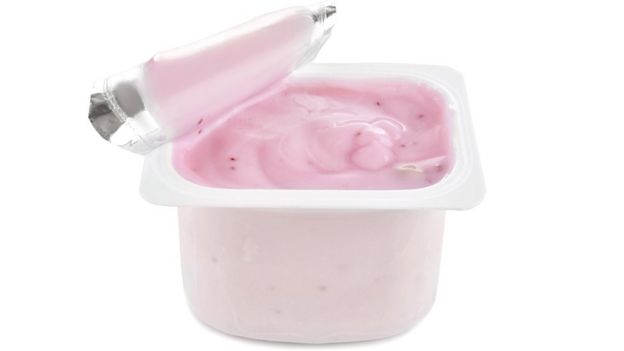Many yoghurts are full of sugar and the public should not be lulled into thinking they are eating healthy products, researchers say.
The conclusion comes after a study of almost 900 yoghurts on sale in UK supermarkets.
The Leeds University-led research found that organic yoghurts were among the most sugary types - containing more sugar per 100g than cola.
Only natural and Greek-style yoghurts could be classed as low in sugar.
The study - published in BMJ Open - comes as government health officials are encouraging manufacturers to reduce the amount of sugar consumed by the public.
Yoghurts have been identified as one of the food types on which Public Health England wants to see progress.
This research was undertaken shortly after the launch of the sugar-reduction programme.

Unsurprisingly, yoghurt desserts contained the most sugar - an average of 16.4g per 100g.
This category also included some products that did not contain yoghurt, such as chocolate mousse and creme caramel.
The second most sugary product was organic yoghurts with a typical 13.1g per 100g.
Children's yoghurts typically contained 10.8g per 100g, the equivalent of more than two sugar cubes, the study found.
By comparison a 100g serving of a typical cola contains 9g of sugar.
The NHS recommends that children aged four to six have no more than 19g of sugar, or five sugar cubes a day, and it is advised that those aged seven to 10 consume less than 24g daily.
To be classed as low sugar there needs to be no more than 5g per 100g.
Only 9% of products surveyed were below this threshold.

How much sugar was in the yoghurt?
Desserts - 16.4g per 100g
Organic - 13.1g per 100g
Flavoured - 12g per 100g
Fruit - 11.9g per 100g
Children's - 10.8g per 100g
Dairy alternatives - 9.2g per 100g
Drinks - 9.1g per 100g
Natural and Greek - 5g per 100g

Since the fieldwork for the study was carried out - at the end of 2016 - progress has been made on reducing sugar consumption from yoghurts.
A report published in May showed sugar content in yoghurts had been reduced by 6% in the first year, making it the only food category to exceed the 5% target. By 2020, it is expected sugar will be reduced by 20%.
PHE chief nutritionist Dr Alison Tedstone said this showed "positive steps" were being made.
But Dr Bernadette Moore, lead researcher of this study, said: "Even if we take the reduction into account, most of these yoghurts will still not be low in sugar.
"I think people, including parents, will be surprised to know just how much sugar there is in yoghurt.
"My advice would be to buy natural yoghurt and mix in your own fruit."
Latest Stories
-
#Election2024: Volta Region takes delivery of ballot papers
13 mins -
Dissolve Black Stars and form a new team – Ernest Thompson
16 mins -
‘We’re cruising; victory is beckoning at us’ – Afriyie Ankrah assures NDC faithful
19 mins -
It’s completely senseless to think I bought one coconut for $100 in Brazil – Afriyie Ankrah
29 mins -
‘There is no way an election in Ghana can be rigged’ – EC
32 mins -
Collation Centres Accreditation: EC, GJA and GIBA planning ‘workable and acceptable’ solution for media
47 mins -
Engage locals in tree planting to reclaim degraded lands – Forestry Commission directs mining companies
1 hour -
Ghana Gold Coin goes on sale: A quarter ounce at GH₵11,188.12 on Nov. 26
1 hour -
Special Voting on Monday, 2nd December, 2024 – All you need to know
1 hour -
3rd F.K. Buah Memorial Lecture honours the Educationist, Author, and Statesman
2 hours -
First Sky Group appoints Dr Elorm Amegatsi as Live Patron
2 hours -
Thousands of job opportunities opened for the youth under Ghana’s Petroleum Hub Project – CEO
2 hours -
Gov’t must act on clean air now – Prof Kofi Amegah
2 hours -
Politicians who ignore social media as a constituency risk losing out – Technology Analyst
3 hours -
Akufo-Addo has built over 200 hospitals, most by any president – Ofosu Nkansah
3 hours

